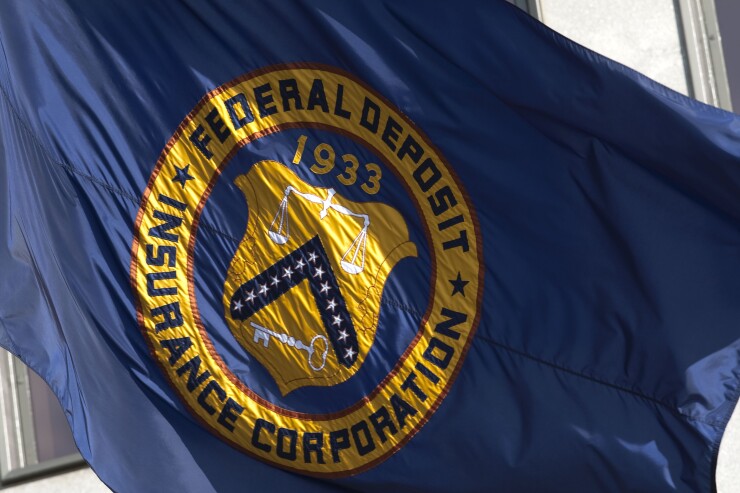
Many in the banking industry fear that
FDIC's Deposit insurance guarantees up to $250,000 of depositors funds will be repaid even if the bank fails. Member banks pay deposit insurance premiums, known as assessments, to fund the DIF, which stood at $128.2 billion as of December 31, 2022.
The FDIC has made clear that banks — not taxpayers — will pay for the rescue of Silicon Valley Bank and Signature Bank's uninsured deposits.
"Any losses to the Deposit Insurance Fund to support uninsured depositors will be recovered by a special assessment on banks, as required by law," the agency wrote in a release detailing their response to the bank failures.
While there is no doubt that the FDIC will raise fees, how they raise fees and from whom remains to be seen. Arthur Wilmarth, professor emeritus at George Washington University Law School, thinks the increasing regularity of the systemic risk exception should be factored into banks' future assessments.
"We've essentially protected all bank deposits twice — during the financial crisis of 2008-09 and again this time," Wilmarth wrote in an email. "If we're going to protect all deposits during a crisis, banks should pay for that privilege on an ongoing basis. I've argued that the same should be true for money market funds, which we bailed out in 2008 and 2020."
Smaller community banks were initially alarmed by regulators' announcement, which didn't specify which banks would pay for this special assessment.
To be sure, small community and regional banks stand to benefit greatly from the FDIC's bailout largely because the system is staving off a run on small banks, but small banks also do not receive the kinds of interventions that Silicon Valley Bank and Signature Bank's customers benefitted from. Wilmarth thinks lessons from
"As we saw with Silvergate, it is very unlikely that a bank smaller than $25 billion would have received treatment similar to SVB and Signature," Wilmarth wrote in an email.
Jill Castilla, president and CEO of $345.7 million-asset Citizens Bank of Edmond, said she thinks the FDIC should tailor the special assessment to big banks.
"I'm not necessarily happy to bear that cost," Castilla said. "But if it's a price that we have to pay in order to ensure stability in the U.S. banking system, I will, knowing that it's for the broader good."
Castilla said she was rethinking the concept of the special assessment on banks after seeing a
Indeed, bankers that said they have long stuck to prudent asset liability management practices — sometimes at great expense — are voicing opposition to funding depositors of banks that failed due to bad management.
"It will be a travesty if the FDIC fund is used to guarantee deposits in excess of FDIC insurance thresholds," said Steven M. Gonzalo, president and CEO of $1.2 billion-asset American Commercial Bank & Trust, a 10-branch bank on the outskirts of Chicago that was founded in 1865.
Sticking small banks with the failures of larger ones is nothing new, said Gonzalo. During the financial crisis in 2008, Gonzalo said, the bank's FDIC premiums jumped tenfold from $30,000 a year to $300,000 a year.
"We were forced to prepay three years of premiums to bail out the very banks that created the problem," he said.
Former FDIC lawyer Todd Phillips thinks small banks shouldn't be too worried, even if Congress is considering raising total insured deposits, big banks and systemically important institutions will pay for mitigating the risk.
"Unless Congress changes the law around the deposit insurance ceiling, I don't expect banks to pay higher insurance premiums. The statutory minimum is still the same," Phillips wrote in an email. "To the extent the FDIC decides to increase the size of the DIF as a result of this weekend, increased premiums will come from the largest institutions, not community banks."
Many small community bankers said they also were shocked that the failed banks did not maximize FDIC insurance by using tools for reciprocal deposit arrangements.
Both Signature and Silicon Valley Bank were members of IntraFi, a privately-held firm in Arlington, Va., that allows deposit swapping, whereby a customer has a single relationship with a bank but can spread deposits among other FDIC-insured institutions, thus helping to maximize deposit insurance coverage. IntraFi was created more than two decades ago by former regulators at the Federal Reserve, FDIC and Office of the Comptroller of the Currency.
Silicon Valley Bank had just $469 million in reciprocal deposits on its balance sheet at year end; Signature had $228.4 million, according to call report data from the Federal Financial Institutions Examination Council.






